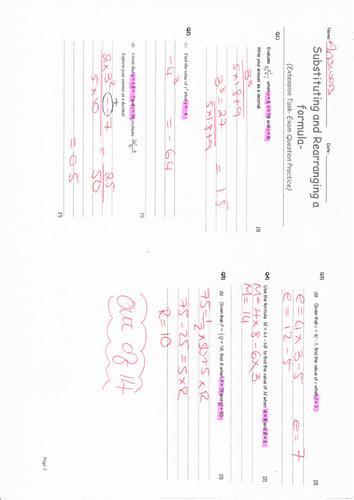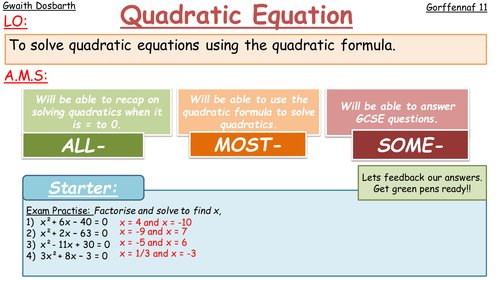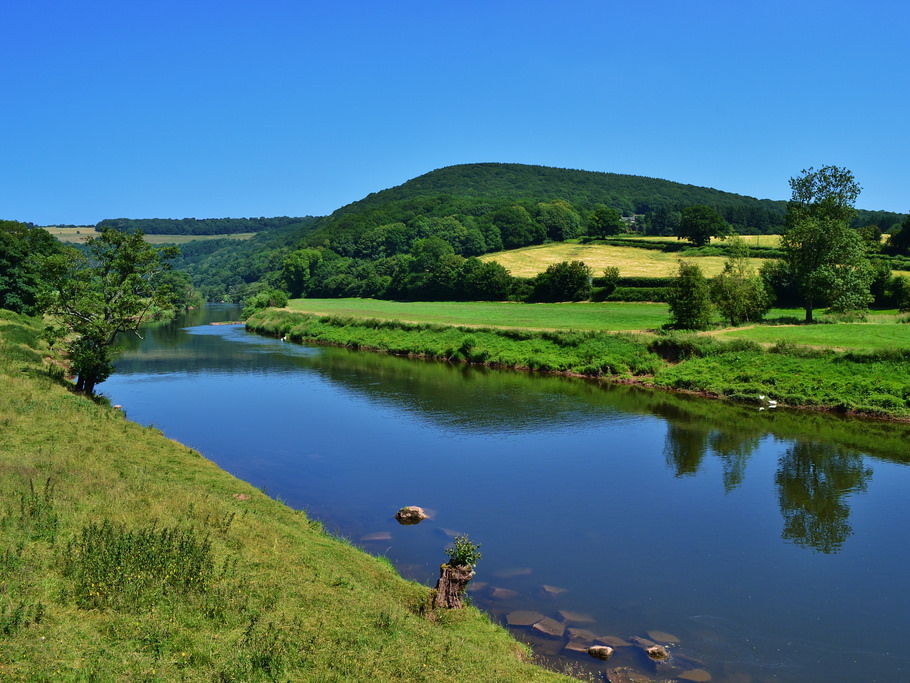
99Uploads
60k+Views
79k+Downloads
All resources

Substituting Numbers into an Expression
A resource pack that helps pupils to get to grips with substituting numbers into an expression.
Starter: Exam Practice- help pupils to recap over the basic questions in the exam that they SHOULD NOT get wrong.
Examples: Explains to pupils how to substitute numbers into an expression- use of colours to show where each number came from.
Main task: Worksheet to work on the knowledge they just gained and to put what they had learnt into practice. (Answers on the PPT)
Extension: Building on what they have learnt into exam questions. (Answers included in PDF format)
Plenary: To reflect upon what they have been able to do, what they need to improve and their TOP TIP for answering these style questions. (Plenary on the main worksheet)

Quadratic Formula (WHOLE LESSON)
A lesson on solving quadratics using the quadratic formula.
The lesson includes a starter which focuses on quadratics, exam tips, examples with a step by step guide, an exercise for pupils to put into practise what they have learnt, exam practise using past paper questions so they can see how it is asked in the exam and even a plenary so pupils can reflect and evaluate their progress in the lesson.
Also, contains a lesson plan and extension task with answers

WJEC/ WJEC Eduqas 2016 SPEC- Theme 5- Lesson 3- Extreme Weather
This lesson is the third lesson in the fifth theme of the new WJEC/ WJEC Eduqas 2016 specification for geography.
This lesson covers extreme weather (Global distribution of cyclones and droughts, Global Circulation and the ITCZ). The powerpoint covers all the information that the pupils need and all tasks are on the powerpoint.
Any feedback on this lesson would be a great help for future lessons uploaded onto here.
JPMathsandGeography

WJEC/ WJEC Eduqas 2016 SPEC- Theme 5- Lesson 1- Evidence of Climate Change
This lesson is the first lesson in the fifth theme of the new WJEC/ WJEC Eduqas 2016 specification for geography.
This lesson covers the evidence that we have for climate change but also evidence showing how the climate has changed. The lessons tasks and all the information are on the powerpoint.
Any feedback on this lesson would be a great help for future lessons uploaded onto here.
JPMathsandGeography

WJEC/ WJEC Eduqas 2016 SPEC- Theme 5- Lesson 2- Natural causes of climate change and carbon cycle
This lesson is the second lesson in the fifth theme of the new WJEC/ WJEC Eduqas 2016 specification for geography.
This lesson covers the natural causes of climate change and the carbon cycle. The powerpoint covers majority of the information need and the information cards help pupils to complete the tasks specified on the powerpoint.
Any feedback on this lesson would be a great help for future lessons uploaded onto here.
JPMathsandGeography

WJEC/ WJEC Eduqas 2016 SPEC- Theme 5- Lesson 6- UK Air Masses
This lesson is the 6th lesson in the fifth theme of the new WJEC/ WJEC Eduqas 2016 specification for geography.
This lesson looks at the factors that affect the UK’s climate, the air masses that affect the UK and how the jet stream plays a role in the UK’s climate. The activities are all included on the powerpoint.
Any feedback on this lesson would be a great help for future lessons uploaded onto here.
JPMathsandGeography

WJEC/ Eduqas 2016 SPEC- Theme 2- Lesson 2- Urban Sphere of Influence
This lesson is the second lesson in the second theme of the new WJEC/ Eduqas 2016 specification for geography.
This lesson covers the what the sphere of influence is. It looks at what weakens and strengths it, an example of a sphere of influence and exam questions to help sum up pupils knowledge.
Everything that you need is on the powerpoint
Any feedback on this lesson would be a great help for future lessons uploaded onto here.
JPMathsandGeography

WJEC/ Eduqas 2016 SPEC- Theme 2- Lesson 8-UK Migration and Ageing Population
This lesson is the eighth lesson in the second theme of the new WJEC/ Eduqas 2016 specification for geography.
This lesson looks at the reasons for migration occuring witin the UK but also looking at the reasons and consequences of an ageing populations. Exam Practise throughout helps pupils understand how what they had learnt may be asked in the exam.
Any feedback on this lesson would be a great help for future lessons uploaded onto here.
JPMathsandGeography

WJEC/ WJEC Eduqas 2016 SPEC- Theme 5- Lesson 15- Human Activity on the Savannah
This lesson is the 15th lesson in the fifth theme of the new WJEC/ WJEC Eduqas 2016 specification for geography.
This lesson looks at how humans impact the savannah. The activities/ tasks and information are all on the powerpoint.
Any feedback on this lesson would be a great help for future lessons uploaded onto here.
JPMathsandGeography

WJEC/ WJEC Eduqas 2016 SPEC- Theme 5- Lesson 13- Wind Power!
This lesson is the 13th lesson in the fifth theme of the new WJEC/ WJEC Eduqas 2016 specification for geography.
This lesson looks at Gwynt y Môr offshore wind far. Pupils research into the wind far and answer the summarising knowledge questions which helps them to do exam practise. The basic information is also on the powerpoint.
Any feedback on this lesson would be a great help for future lessons uploaded onto here.
JPMathsandGeography

WJEC/ Eduqas 2016 SPEC- Theme 3- Lesson 1- A Tectonic Planet
This is the 1st lesson in the 3rd theme of the new WJEC/Eduqas 2016 specification for geography.
This lesson covers an overview of the structure of the world, how tectonic plates move, the distribution of the worlds earthquakes and volcanoes and Alfred Wegener. The Alfred Wegener evidence pack is NOT mine and was created by Clund on Tes (so I do not take credit for this).
Any feedback on this lesson would be a great help as they will help to improve future lessons that I upload.
JPMathsandGeography

WJEC/ Eduqas 2016 SPEC- Theme 3- Lesson 2-Plate Margins
This is the 2nd lesson in the 3rd theme of the new WJEC/Eduqas 2016 specification for geography.
This lesson looks at different types of plate margins and the different hazards that form at each of them but also the large scale features that form at a destructive and constructive plate margin. The destructive plate margin formations is a gap fill exercise.
Any feedback on this lesson would be a great help as they will help to improve future lessons that I upload.
JPMathsandGeography

WJEC 2016 SPEC- Theme 1- RIVERS TEST WITH FULL DETAILED MARKSCHEME
A test that assesses pupils understanding of the river’s section of THEME 1. This test uses past exam questions from WJEC and AQA (because the question format is fairly similar) exam boards.
The test also comes with a detailed mark scheme that looks very similar to a real WJEC mark scheme.
Any feedback would be great!
JPMathsandGeography

WJEC/ WJEC Eduqas 2016 SPEC- Theme 1-COASTS-Lesson 3- Long shore Drift and Depositional landforms
This lesson is the 3rd lesson in the first theme of the WJEC/ WJEC Eduqas 2016 specification for geography- COASTS.
This lesson looks at longshore drift and how it is involved in the formation of a spit. The lesson also looks at how beaches are formed.
Everything that you need is on the powerpoint.
Any feedback on this lesson would be a great help for future lessons uploaded onto here.
JPMathsandGeography

WJEC/ WJEC Eduqas 2016 SPEC- Theme 1-COASTS-Lesson 1- WAVES!
This lesson is the 1st lesson in the first theme of the WJEC/ WJEC Eduqas 2016 specification for geography- COASTS.
This lesson acts as an introduction to the coast section by looking at the main coastal processes and looks at indepth waves. Everything that you need to teach this is on the powerpoint.
Any feedback on this lesson would be a great help for future lessons uploaded onto here.
JPMathsandGeography

WJEC/ WJEC Eduqas 2016 SPEC- Theme 1-COASTS-Lesson 6- Holderness Coastline Case Study
This lesson is the 6th lesson in the first theme of the WJEC/ WJEC Eduqas 2016 specification for geography- COASTS.
This lesson looks at the case study of Holderness. It is an investigation type of lesson so the work is only up to the pupils to do and find out.
Everything that you need is on the powerpoint.
Any feedback on this lesson would be a great help for future lessons uploaded onto here.
JPMathsandGeography

WJEC/ Eduqas 2016 SPEC- Theme 3- Lesson 4- Vulnerability
This is the 4th lesson in the 3rd theme of the new WJEC/Eduqas 2016 specification for geography.
This lesson looks at different factors that increases vulnerability and different methods to reduce a persons/ countries vulnerability. The lesson also looks at volcanic hazards. All the activities that are needed is on the powerpoint.
Any feedback on this lesson would be a great help as they will help to improve future lessons that I upload.
JPMathsandGeography

WJEC/ WJEC Eduqas 2016 SPEC- Theme 1-COASTS-Lesson 2- Coastal Processes & Headland formations
This lesson is the 2nd lesson in the first theme of the WJEC/ WJEC Eduqas 2016 specification for geography- COASTS.
This lesson looks at the erosional and transportational processes and how they work together to form headlands and bays, caves to stumps and wave cut platforms/notches.
Everything that is needed to teach this theme is on the powerpoint.
Any feedback on this lesson would be a great help for future lessons uploaded onto here.
JPMathsandGeography

WJEC/ Eduqas 2016 SPEC- Theme 2- Lesson 10- Sustainable Urban- Rural Communities
This is the tenth lesson in the second theme of the new WJEC/ Eduqas 2016 specification for geography.
This lesson looks at how we create sustainable communities/ the different factors that help us to create one. Students also look at what Egan’s wheel is and how it is used to help us to create a sustainable community. Students also look at BedZED as our case study of a sustainable community (this is done as a research/ ICT task).
Any feedback on this lesson would be a great help as they will help to improve future lessons that I upload.
JPMathsandGeography

WJEC/ WJEC Eduqas 2016 SPEC- Theme 5- Lesson 5- High Pressure Systems and California Drought
This lesson is the 5th lesson in the fifth theme of the new WJEC/ WJEC Eduqas 2016 specification for geography.
This lesson looks at high pressure systems and the associated hazards. Pupils explore the hazards through the case study of California Drought.
Any feedback on this lesson would be a great help for future lessons uploaded onto here.
JPMathsandGeography




















